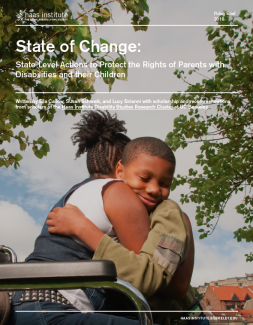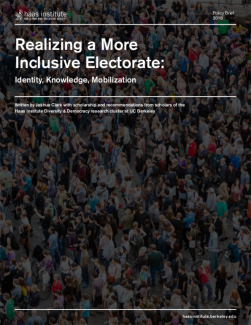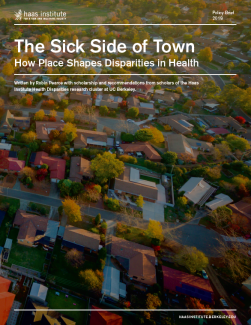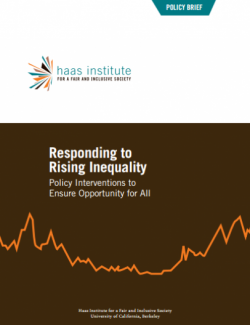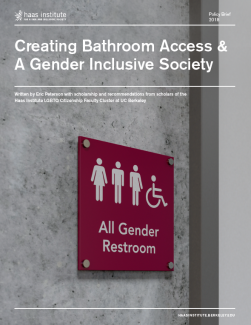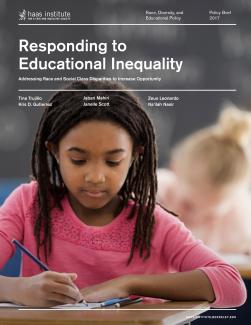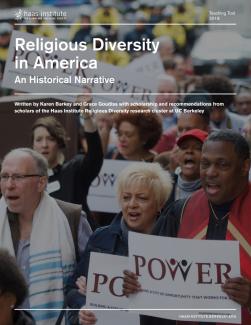This policy brief provides an overview of current legislation that discriminates against parents with disabilities. It will also consider non-discriminatory legislation that has been enacted or is currently being enacted at the state level, with the hope of encouraging more states—eventually all states—to adopt similar legislation. It is our strong belief that such legislative changes are both needed and deserved by the at least 4.1 million disabled parents currently raising children under the age of 18 in the US as well as by the roughly 6.1 million children who rely on them for care. Access this brief here.
This policy brief, which synthesizes research from the Haas Institute Diversity and Democracy affiliated faculty, lifts up lessons from recent research on how to confront voter disaffection, support inclusive identities, and increase democratic participation among underrepresented groups. The brief argues that many conventions of polling, categorizing, and engaging voters in campaign outreach reinforce chronic disparities in US election turnout—disparities that are particularly stark in midterm years like 2018. If we are to work toward a voting electorate that more closely mirrors the country’s diverse citizenry, we must confront the ways the information we do or don’t collect—and the outreach we do or don’t fund—contributes to a cycle of exclusion and non-participation. Access this brief here.
Diversity & Health Disparities Brief
This policy brief reviews recent scholarship from members of the Diversity and Health Disparities cluster and offers important insights to meet the intertwined challenges of neighborhood inequalities and racial health disparities. The brief first reviews how the inclusion of place in research about health disparities initiates a new dialogue about the basis for persistent racial/ethnic health disparities that departs from discriminatory ideas linking them to what are thought to be natural differences. The brief next considers how residential segregation contributes to differences in neighborhood conditions and racial/ethnic health disparities. Taken together, the research presented in this brief provides new ways the think about health disparities and their causes, consequences, and potential remedies. Access this brief here.
One of America’s defining ideals is the idea that opportunity is available to all, regardless of where one starts on the economic ladder. The reality is that income inequality has grown dramatically since the 1970s and that increasing inequality has not been matched with growing economic mobility. This policy brief reviews recent scholarship from members of the Economic Disparities Research Cluster and offers important insights as well as policy-based solutions in order to meet the profound challenges of income and wealth inequality and growing poverty now facing American society. Access this brief here.
This policy brief reviews literature on the challenges transgender and gender-nonconforming individuals face in overcoming discrimination and harassment, with particular focus on the role of conditioning restroom access as a key site of social exclusion. Legal challenges to the regressive restroom policy argue that some solutions—such as mandating transgender individuals use a separate single-user facility—do little to address the indignities of unequal access. The brief outlines solutions to address the problem, focusing especially on data collection of gender identity and access needs, as well as strategies in the designing and planning of gender inclusive, rather than gender neutral, bathroom facilities. These strategies will allow policymakers to enable restroom inclusion while addressing concerns about safety, especially focusing on the need to recognize the intersectional needs and concerns bathrooms hold in society. Access this brief here.
Race, Diversity & Educational Policy Brief
This policy brief reviews scholarship by members of the Race, Diversity, and Educational Policy Cluster to advance a broader and more complex understanding of the persistent failure of US schools for youth from non-dominant communities. This report takes up a critical issue in education: the continuing reproduction of educational inequality in relation to race and social class. In doing so, it highlights several key issues in how we study and attempt to ameliorate disparities through educational policy. We conclude with a set of recommendations for policymakers and advocates. Access this brief here.
How can we think about American religious diversity? Is it just diversity on the ground, or a pluralism where difference is interactive and where groups show mutual respect and value each other’s difference? It is the task of this brief by the Religious Diversity Cluster to rethink the question of American pluralism, indicating the historical moments when diversity came into question, but also to highlight the strategies of managing diversity. Access this brief here.
